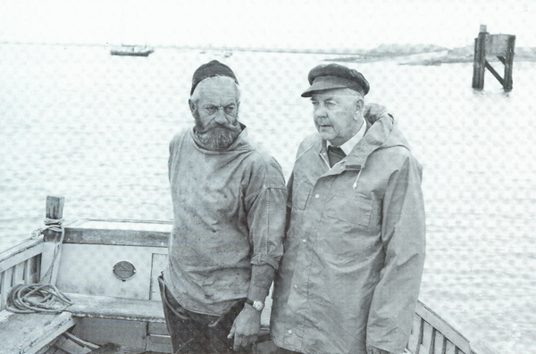|
|
 |
||||||
|
“My Orford” - Life After Farm Work |
||||||
|
With the mechanisation taking place on the farm it was obvious that less labour would be required so when the Atomic Weapons Research Establishment advertised vacancies I was one of many who applied for a job. Getting a job on a farm was fairly easy but with AWRE it was very different. I went to the labour exchange at Ipswich and appeared in front of a panel of four men who fired questions on all sorts of subjects, I was applying for a Plant Attendants job looking after steam boilers and air conditioning plant, a job I knew precisely nothing about. I was later offered the job subject to being security cleared by a process known as 77 positive vetting. A process necessary to ascertain I had no Communist connections because of the secret work which was to be carried out. I started the new job on shift work initially working a twelve hour shift seven days a week. When I received my first pay packet, which was over double a farm workers wage, I felt like a millionaire. By starting this job with AWRE I realised it would alter by whole way of life. It is also a fact that the AWRE had a great beneficial affect on the village, in addition to providing employment for many people, they spent thousands of pounds repairing the quay by having it completely reconstructed with steel piling, a stronger concrete ramp was laid alongside and a car park was constructed between the river wall and the delf ditch. AWRE encouraged us to take courses, the first one was for a City and Guilds boiler operators certificate and was fairly easy. The second one for a City and Guilds certificate in Boiler House Practice was more difficult. A knowledge of logarithms was needed, something I had not been taught at Orford school. Fortunately, my eldest son Peter, who had passed the eleven plus and was attending Woodbridge Grammar School was able to give me instruction. I obtained both certificates with credit. After a time more plant attendants were employed and our hours were cut down to five eight hour shifts per week which meant less money in our pay packets. With an ever increasing family this was a bit of a blow, I was still in the part time fire service and when the Orford Ness lighthouse was fully automated and a part time attendant was needed I applied for and obtained that job. I also started doing painting and decorating and doing small house repairs. On one occasion only I worked the 6am to 2pm shift, went to the lighthouse on my daily visit then continued painting a house I was working on when the fire siren sounded and I turned out to a fire, all four jobs in one day. |
||||||
 |
||||||
|
Harbourmaster Ralph Brinkley and Charlie Underwood returning from a visit to the Lighthouse |
||||||
|
The point of it all was to give our sons a decent upbringing, an improved way of life, better than we had had, I have been told by one of my sons that he would have liked to see more of me but he realises why I did all the work. Looking back in later years my wife and I sometimes wondered if it was worthwhile, the long hours I was working, the apple picking and other part time jobs she did in addition to bringing up six sons. Then we would look at the boys, each successful in his chosen career and know that we did the right thing. |
|
Postscript: The final paragraph above was the last words to be written by my father for his second book and the paragraph was subsequently read out at his funeral. During my childhood I didn’t appreciate the sacrifices my parents had made whilst I and my brothers were growing up. I do now and always will. Thanks Mum and Dad. Adrian Underwood |
| [Home] [My Orford] [Preface] [1. The Castle] [2. The Borough] [3. The Church] [4. An Orford Miscellany] [5. School Days] [6. Businesses] [7. Recreation] [8. Orford Ness] [9. Wartime Orford] [10. Post War Orford] [11. The East Coast Floods] [12. The Fire Service] [13. Life After Farm Work] [Addendum] [Orfordness Lighthouse] [Orford Photographs] [Orford Ness Photographs] [Other Photographs] [Family Tree] [Links] [In the News] [Feedback] |